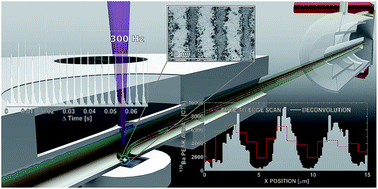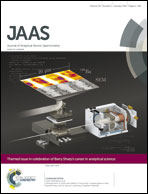Development of a fast laser ablation-inductively coupled plasma-mass spectrometry cell for sub-μm scanning of layered materials†
Abstract
Performance data are reported for a commercially available laser ablation-inductively coupled plasma-mass spectrometry (LA-ICP-MS) setup, equipped with a custom-made cell. The low dispersion ablation cell and the connecting tubing achieve a 99% washout of the aerosol in ∼6 ms, enabling separated pulse responses at frequencies up to 200–300 Hz. In addition, the cell employed supports a post-acquisition methodology for the deconvolution of overlapping ablation positions in scanning mode by an iterative Richardson–Lucy algorithm. This enables correction of the distortion in the scan profile upon traversing layers with dimensions below the physical size of the laser beam. By overlapping the ablation positions of a 1 μm diameter laser beam, a lateral resolution in the order of 0.3 ± 0.1 μm was demonstrated for scanning of μm-sized layers in high capacitance multi-layer ceramic capacitors.

- This article is part of the themed collection: Themed issue dedicated to Barry Sharp

 Please wait while we load your content...
Please wait while we load your content...